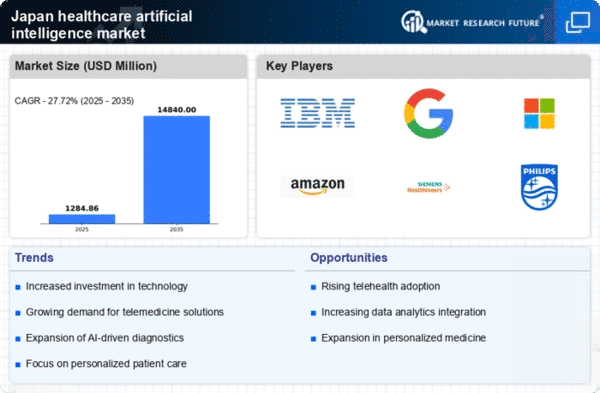Government Initiatives and Funding
Government initiatives and funding play a crucial role in shaping the healthcare artificial-intelligence market in Japan. The Japanese government has recognized the importance of AI in healthcare and has initiated various programs to promote its integration. For example, the Ministry of Health, Labour and Welfare has allocated substantial funding to support AI research and development projects aimed at improving healthcare delivery. This funding is expected to enhance collaboration between public and private sectors, fostering innovation in AI applications. Additionally, the government's commitment to digital transformation in healthcare is likely to create a conducive environment for the growth of the healthcare artificial-intelligence market. With increased financial support, healthcare institutions are more inclined to adopt AI technologies, which could lead to improved patient care and operational efficiencies.
Integration of AI in Telemedicine Services
The integration of AI in telemedicine services is emerging as a key driver for the healthcare artificial-intelligence market in Japan. With the increasing adoption of telehealth solutions, AI technologies are being utilized to enhance remote patient monitoring, virtual consultations, and health assessments. AI algorithms can analyze patient data in real-time, providing healthcare professionals with actionable insights during telemedicine interactions. This integration not only improves the quality of care but also increases accessibility for patients, particularly in rural areas. The telemedicine market in Japan is expected to grow significantly, with estimates suggesting a CAGR of around 25% over the next five years. As telemedicine continues to evolve, the role of AI in facilitating effective remote healthcare delivery is likely to expand, further driving the growth of the healthcare artificial-intelligence market.
Growing Focus on Data-Driven Decision Making
The healthcare artificial-intelligence market in Japan is witnessing a growing focus on data-driven decision making. As healthcare providers increasingly rely on data analytics to inform clinical decisions, the demand for AI solutions that can process and analyze large datasets is on the rise. This trend is particularly evident in areas such as predictive analytics, where AI can identify potential health risks and suggest preventive measures. The ability to leverage data effectively is becoming a competitive advantage for healthcare organizations, as it allows for more personalized and timely patient care. The market is projected to expand as healthcare providers seek to implement AI-driven data analytics tools that enhance their decision-making capabilities. This shift towards data-centric approaches is likely to redefine operational strategies within the healthcare artificial-intelligence market.
Advancements in AI Algorithms and Technologies
Recent advancements in AI algorithms and technologies are significantly impacting the healthcare artificial-intelligence market in Japan. Innovations in machine learning, natural language processing, and computer vision are enabling more accurate diagnostics and personalized treatment plans. For instance, AI systems can analyze vast amounts of medical data, leading to improved predictive analytics and decision-making processes. The integration of AI in imaging technologies has shown to enhance the accuracy of radiology interpretations, potentially reducing diagnostic errors by up to 20%. As these technologies continue to evolve, they are likely to attract further investment and interest from healthcare providers, thereby fostering growth in the healthcare artificial-intelligence market. The ongoing research and development efforts in AI are expected to yield even more sophisticated tools that can address complex healthcare challenges.
Rising Demand for Efficient Healthcare Solutions
The healthcare artificial-intelligence market in Japan is experiencing a notable surge in demand for efficient healthcare solutions. This demand is driven by an aging population, which is projected to reach 36.5% of the total population by 2040. As the number of elderly individuals increases, the need for innovative healthcare solutions that can enhance patient care and streamline operations becomes paramount. AI technologies are being integrated into various healthcare processes, including diagnostics, treatment planning, and patient management. The market is expected to grow at a CAGR of approximately 30% from 2025 to 2030, indicating a robust expansion in the adoption of AI-driven solutions. This trend suggests that healthcare providers are increasingly recognizing the potential of AI to improve operational efficiency and patient outcomes, thereby propelling the growth of the healthcare artificial-intelligence market.
















